5000 Portuguese Words You Already Know
Have you ever noticed that sometimes you can look a Portuguese word you’ve never seen before, but still understand what it means?
Or if you have already had a Portuguese conversation, you may have even successfully guessed a word you had never previously studied, just by changing the ending of an English word.
When words are similar in multiple languages, they’re called cognates. Despite the dry-sounding name, they are very powerful and can be used to add thousands of Portuguese words to your vocabulary.
Disclaimer: This is one of our first videos, so we take a few minutes to loosen up. Keep watching, we think it will be worth it.
Grab the PDF below and hit play to get started!
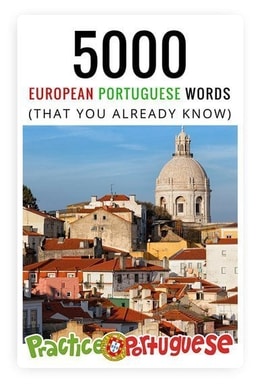
Download the Featured PDF for free below
 We hate spam and guarantee you 100% privacy. You can unsubscribe at any time.
We hate spam and guarantee you 100% privacy. You can unsubscribe at any time. Download PDF
Download PDF
December 19, 2023
May 21, 2023
May 14, 2023
May 7, 2023
April 30, 2023
April 23, 2023
April 16, 2023
April 9, 2023
April 2, 2023
March 28, 2023
 We respect your privacy and have a ZERO TOLERANCE for spam.
We respect your privacy and have a ZERO TOLERANCE for spam.



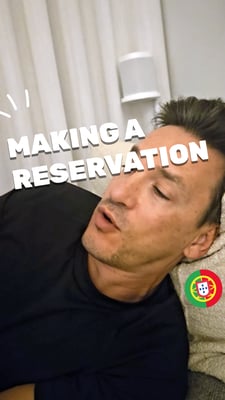



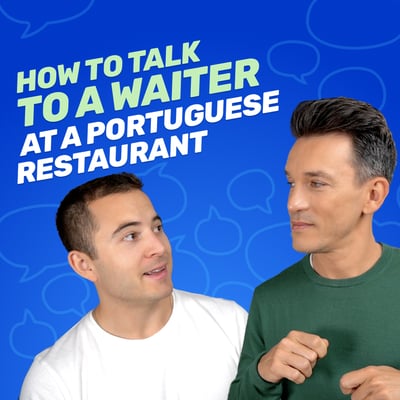
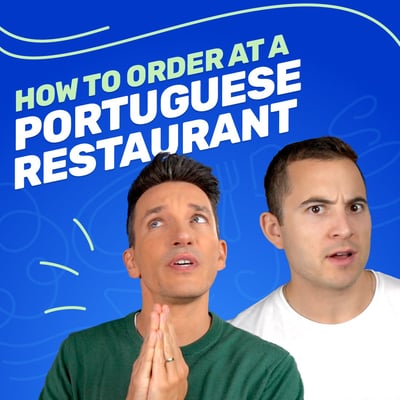
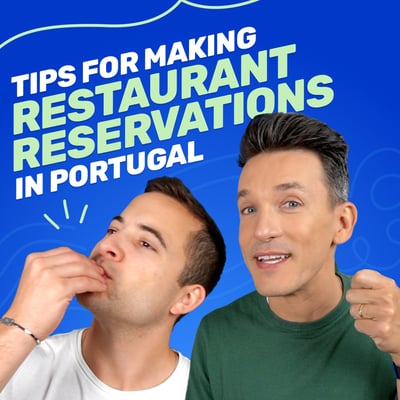
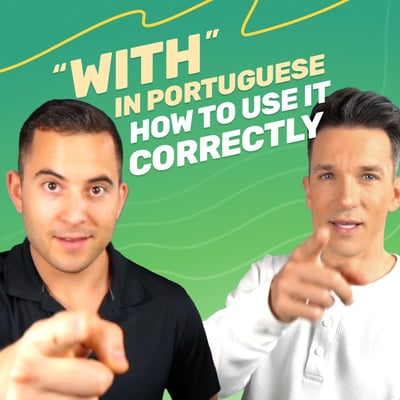
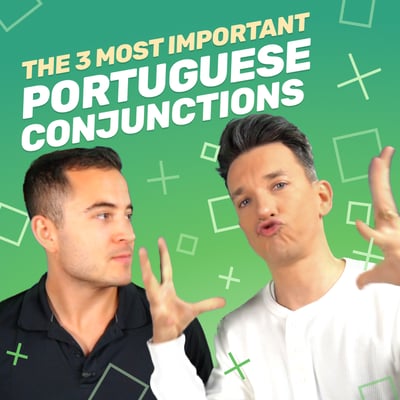
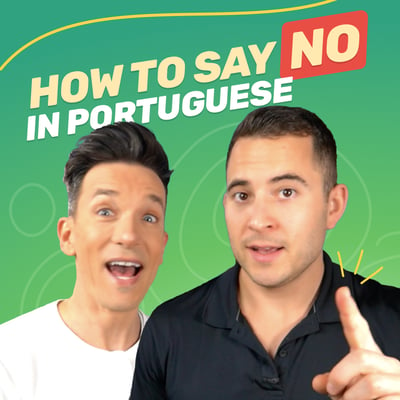
Obrigada! love it:-) Thank you, this is SUPER helpful!
Fantástico!
I like it very useful thank you think ive learnt a lot Excelente!
You are amazing! Thank you for all you do. I love your podcasts, videos- it was something I was looking for for a long time!
You guys are great. Really helpful and clear information. And you are funny.
Gaynor (from Australia).
Great video. Real help on cognates and on pronunciation.
Fantastico! Uma grande apresentação, excelente comunicação virtual, e imformação muito importante. Obrigada!
Muito obrigado pelo comentário!
Esse video foi incrivel!
Eles são divertidos e talentosos. A lição é útil porque ajuda a salvar ambas as palavras e pronúncia !! Eu gosto muito de vocês, atè a proxima !!!
FANTASTICO!!! Obrigada
Great! Thank you very much! Muito obrigado! 😉
This is really great! Your being so proactive is very much appreciated.
Excelente! Obrigada :-).
Ótimo! Great video and very helpful. Muito obrigada!
This lesson is great! It’s a good review and makes such good sense to have vocabulary presented into logical groupings. Thank you!
Muito divertido e útil também – Obrigado Joel e Rui!
– Nick
I’ve been learning Portuguese for several years. This is the best lesson I’ve ever had. So easy to remember and use in conversation. Brill.
Absolutamente eco dos comentarios! Obrigadissimo!
You guys did a great job!!! Fabuloso!!!! It motivates me to knock on the door of the school in the Município de Lagoa again to see if they are starting the Portuguese course for foreigners this year!! Keep up the good work!!
Thanks so much Kathleen! We worked hard on this one and glad it paid off 🙂 good luck if you decide to enroll in the course and hope this gives your vocabulary a head start
wow! that’s brilliant thank you!
Love the video!
Do you have any
Svenska – Porugiska ?
Is it any words? Yuo know Stockholm, sweden.
At the moment we don’t have any translations, but maybe in the future. Thanks Lena
Excelente! Um verdadeiro curto-circuito – muito obrigada.
Sue
Such fun!….the end section was the best…..oh yes, muito helpful too!! Ate proximo 😀
Super super inteligente, ou não fossem da família.
Vocês já repararam que o que vocês estão a fazer também serve um pouco para quem quer aprender inglês?
Isso é uma maneira muito inteligente de ensinar.
Brilhante
Este vídeo é muito útil. Aprendi coisas novas que me vai ajudar. Eu agradeço por todo.
Obrigado Joel & Rui
Rui e Joel! Vocês continuam a fazer um excelente trabalho. Este vídeo vai certamente agradar aos meus alunos. Abraço aos dois.
Pedro, Suécia
Brilliant – really helped
Good stuff!
You guys are great, I really enjoy to learn the language with your support. Mi piace il portoghese! (Happy subscriber)
Thanks for supporting us the last couple months, Laura 🙂
I appreciate your doing this so much! It has been needed to be done for a very long time. I cannot begin to put a value on it. Muito obrigado!
Muito bom! Parabéns! 🙂
Thanks so much Rui and Joel! I write this from Madeira where I am visiting my husband’s family. His parents do not speak English. Sadly, I do not yet speak Portuguese conversationally, but I’m learning! Your podcast is great and this video was too!
Very useful… particularly the ‘close-up’ pronunciation….. thank you!
Well done Rui and Joel. You are helping me to persevere!
Thanks for the comment, Wendy and also for your Premium support this month! Keep on perseverin’ 😉
Great work and a very useful resource.
Good job guys, you are cute! I teach portuguese to foreigners in Portugal and sometimes use your stuff, it’s cute. ☺️
Obrigado Tamara for sharing our work, we’re glad to help, (especially when complimented as cute!) Keep in touch
That’s a chunk for a gramma in the US, but nice ti know there is some help.
Hi Lowell! Even Grandmas can learn, we’ve got at least a couple premium members in their 70’s! Glad to help 🙂
obrigada!
Adorei. Muito giro mesmo!!! Jinhos
Brilliant!
I loved this video! You guys really bring a potentially boring but incredibly useful lesson to life. The bloopers are a nice touch, too 🙂
This video is a great idea
Muito obrigado pela informacao. Acho que este aula e muito facil a compreender.
Muito obrigado! vocês têm sido de grande ajuda para eu aprender a falar português. Parabéns e muito mais éxito.
Muito Obrigada!
Good fun and whilst there was a lot of content (as you said) it was good fun and easy(ish) to follow. I just realised I should have written this in Portuguese … d’oh!
Muito obrigada Joel e Rui, é excelente.
Parabéns e obrigado Joel e Rui! Um excelente vídeo. Muito educativo e divertido. Just the kind of thing a raw beginner like me needs. As I’ve told you before, Joel, I really like your warm and light hearted approach. Probably my biggest issue in language learning is my discomfort with screwing up so I especially thank you for your coaching in that regard. I am looking forward to the next instalments.
Hi Joel and Rui
The video was great. I have been learning Portuguese for almost 5 years but had never had cognates pointed out. should make a lot of conversation that much easier. Thanks and keep it up!!
Great video! But I’m REALLY looking forward to the next one on the vowels! I’m hoping to be able to start to get the hang of the way the Portuguese seem to drop so many vowels when speaking at a normal rate. Keep up the good work! From a new subscriber…..Dave, So. Cal
Love, love, love and love. I have lived in France for 13 years, i am English and 56 years old, i can only learn with associação and had worked a few of these out for myself. I come to Portugal as often as possível with the intenção to live there one day soon. You guys have made my day, thanks so much, you really are amazing and funny too, this has helped me alot!!!
Jaquelina, thanks for the comment and for the email msg the other day too! Glad we could help and hope the next video about pronunciation (which we’re on track to launch tomorrow) helps too!
Best ever lanuguage lessons that i have ever had. Totally works for me, thanks guys.
Bakane!! Força Rui e Joel!! Obrigadinho pelo seu trabalho!!
Very nice job, chaps! The flowchart showing how you apply the process in conversation was especially clever.
Obrigada! Fico a espera dos outros episódios.
Thanks guys, your lessons are so interesting, never a dull moment. Best learning experience ever.
Muito obrigado! You guys are the best!!
very helpful, thanks
BTW – GREAT video. Loved this one and the dropping the vowels one.
You are awesome! I’m Russian, live in Moscow and study Portuguese. Unfortunately, i can’t find native speakers here in the city, but your video is really helpful!
Awesome to hear from Russia and glad we could help! thanks Valentina 🙂
What particularly helps is that it clarifies words that are masculine that end in ‘a’ – one of the things which has regularly had me stumped.
Thank you!! You two are adorable. Or is it adorável
When is numero dois going to be out. I’m in Madeira and can’t understand a thing these wonderful people say. Please hurry!!
We just launched it! http://www.practiceportuguese.com/vowels/
Enjoy 🙂
What great stuff you guys do. Parabéns. Keep going! Worth every single €
Very helpful. Obrigado. How do I find out when the second video is available?
Thank you Very good for the first 26 minutes very professionals then the last 2 -3 minutes you both become 2 kids
thank you very much it is a pleasure watching your vedio very well done you could have omitted the last 2 minutes.
Keep up the good work.
Muito obrigado, é um prazer assistir seu vedio muito bem feito que poderia ter omitido os últimos 2 minutos.
Mantenha o bom trabalho.
Thank you very much. Appreciate the work you ‘ve done very much . Muito obrigado
Thanks for the video, I’m glad I was recommended your site, It’s very easy to use and I’m sure it’s going to help a lot. I’ll be spreading the word.
Muito obrigada!! Looking forward to the next video!
Excellent, thank you!!
you guys are so fun to watch and your video was very helpful. muito obrigada
Estive a ver os vídeos com algum deleite. Sou professora de Português, mas tenho um marido estrangeiro que está a aprender português e todo este material poderá ser excelente para ele. Muito grata pela partilha ! 🙂
GENIAL!
Moito obrigada!
Very helpful and very funny, thank you so much
Sou um falanate de Português (de Portugal— claro!) e nunca me tinha apercebido do que seria que fazia “tropeçar” os Ingleses no aprendisado da nossa língua . Achei muito engraçado o espanto deles por ser vulgar “comer” (fazer desaparecer) as vogais no início, no fim e até no meio de palavras… Sem me dar conta reconheci que nos afastamos muito da palavra escrita ao falar …
Really great!!!!!!!! Thank you guys!!!!!
Muito obrigada! Totally enjoyed it (and learned something)
Thanks. Very helpful. I’ve just discovered your website and it looks like it fills a gap that I need. I’ve just started learning Portuguese but it’s difficult because a) most of the stuff online is Brazilian not European and b) in terms of listening I need something that is more than chamo-me Joao but isn’t authentic Portuguese TV where I can hear maybe one word in one hundred if I’m lucky.
Obrigado Rui e Joel! Excellent video – I’ve learnt a lot. Great content and pace. Fantastico
Excellent, very helpful I am sure I will learn a great deal. Thank you.
Muito Obrigado. Je suis francophone et cependant votre leçon était très claire et facile à comprendre. Quel enthousiasme et quelle bonne humeur vous nous faites partager !
Muito Obrigado.. Fantastico!
Obrigada! Era uma boa revisão. Vocês são tão giros! 😀
Muito obrigado Rui e Joel!
Gosto muito o entusiamo de vocês. Estes videos vão facilitar as minhas tentativas de falar português.
(Tenho 69 anos, sou reformado holandês and I stay every year a few weeks in Algarve)
Thank you so much for this great lesson Rui and Joel! My daughter and her husband live in Lisbon and it is one of my favorite cities.
I’m determined to learn more Portuguese for my next visit and your lessons are fun as well as informative.
Loved the video, you both are really cute! 😀 Cumprimentos da Húngria 🙂
Genial, brilhante, inteligente, incrível, formidável, fantástico, magnífico, extaordinário, enorme !!!! Vou atingir as 10 000 palavras com o meu Francês Ü Muito obrigada Rui e Joel !
Although I already knew about cognates the PDF added to them and explained them really well. Muito obrigado!
As a new resident living in Angola, and hope to soon visit Portugal for my R&R, your instructional material has helped me imensamente! I am 50 years old, and meu motorista says that I speak Portuguese very well (I disagree, as I am still struggling.) Please keep the materials coming. You have hit a niche that really needs filling.
I am brand new to this language and y’all and broken it down so well. I feel confident I can feel comfortable by the time we move to Portugal in six months. So thankful I found y’all!!! Thank you.
Excelente!! Fez-me rir o que me fez querer saber mais Excellent made me laugh which made me want to learn more.
First class!
Muito bom!
Ola mãe! Viva Portugal! até a proxima
Great work.. e extremamente simpático!
You guys are brilliant brilliant super brilliant.Thanksxx
I never thought that learning Portuguese could be fun but you guys have made it so easy and enjoyable. Extremely useful..and the giggles at the end aslo.
Whew, that was a lot to digest. I will stay with though.
Obrigada – eu gostei muito – sou inglesa mas meu marido e Portuguese – obrigada
Well done guys. Great help to get started to learn Portuguese.
Because of you two, I am closer to sign up for the monthly service.
And I did sign up for the monthly service and enjoying it DAYLY
Great job guys, aprendi muito daquele video!
Any rules for words ending with TUDE (gratitude etc…) ?
Good question! There are fewer words with this suffix so it’s harder to find as much info compared to the others. But the words are generally the same as in English (and by the looks of it, also French, Spanish etc), and are generally feminine. Eg. A attitude, a latitude, a longitude. However, there are exceptions that change from English, like gratitude -> gratidão. And there are some that exist in PT but not EN, like youth -> juventude
I found the cognates to be very useful. Building vocabulary and sentence structure are my greatest challenges now.
Now I think I know a lot more vocabulary, and your clear pronunciation is great and easy to understand.
Hi guys,
I’ve been going to Portugal at least twice a year since visiting Lisbon on the 2012 Tall Ships Race and quickly fell in love with the country so the obvious next step was to learn the language.
I’ve been (slowly) learning from books and CDs but having discovered your site they are now just supporting material. I’ve been working through the basics and have found them well structured and paced just right. The other big plus is that I don’t have to worry about picking out the Brazilian variations. Anyway, I have just rented an apartment in Porto for all of next September so now I have a target date to get my conversation up to a reasonable level.
Thanks and keep up the good work,
Dave
Hi David, great to hear from you and thanks for your support this past year, we literally couldn’t continue without member support, so we’re very grateful to have you along. Exciting to hear about your plans to stay in Porto – having a deadline like that is a great way to stay motivated, and it sounds like you’re well on your way. All the best of luck, and keep in touch! Abraço
Your site has so much excellent resources I feel bad to suggest more, but a future addition could be vocabulary work based on the cognates. For me to learn the cognate rules and fully internalize I need to practice and practice so maybe taking 50 or so common cognates per rule ex -ly=-emente and then creating online drills to fully reinforce and become second nature.
This is a great idea Rafael, and it’s on our list! We’d also like to do something similar for the open/closed vowels video. Thanks for your support 🙂
U guys r amazing…I wished I had my portuguese course with u. 2 Weeks at a Lisbon language school didn’t teach me, what I learn here with u 2…muito muito obrigada
uma licao fantastica,fluente e memoravel.
Obrigada!!
Loved it! Obrigada!
Muito boa lição. Obrigado.
Informações muito úteis. Obrigado.
Obrigado Joel e Rui. Will we be able to start with simple sentences using these cognates? That would help to give us confidence. (from a 78 year-old grandmother.)
Muito bem courage
Thank you both, nothing new to add from above but “WONDERFULLY USEFUL”
muito bem feito guys !!! obrigadinho 😉
Gosto de todas essas palavras. Obrigada
Just brilliant. Obrigado
You guys are amazing! Eu moro em Lisboa desde janeiro e os vossos podcasts acompanharam os meus dias e vao faze-lo em futuro! Never been so excited to learn, obrigada 🙂
Excelente! That was great, guys!
Caros Rui e Joel,
Desculpe. Como é que eu podia ver os outros dois videos nesta série que se referiam no podcast do 2016? Deviam ser muitos interessantes e informativos, e gostaria muito de os ver. Obrigado pela sua ajuda!
–Phil
Olá Phil! Obrigado pelo interesse. Aqui tens os outros dois 🙂
– “5000 Portuguese Words You Already Know”: http://www.practiceportuguese.com/videos/words/
– “Tips & Tools For Learning European Portuguese”: http://www.practiceportuguese.com/videos/tools/
It shows your hard work.You must have done research to creat this amazing piece of work.Your hard work is good for the new learners like me to learn portuguese language .May god bless both of you.thanks alot friends .I wish success in your life ahead .
helpful video,great
The last few minutes …thank you!!
Òtimo. A melhor aula de portugues que tive !!
Como é que eu podia ver os outros dois videos?
Obrigado
Obrigado pelo comentário! Todos os vídeos estão na secção de Vídeos, mas é verdade que esta série de 3 vídeos não está super acessível, por serem mais antigos. Aqui estão os outros dois:
Open & Closed Vowels in European Portuguese
Tips & Tools For Learning European Portuguese
Excepcionalmente profissional e benéfico. Obrigado senhores
Great video! I have been searching for European Portuguese lessons, but unfortunately I can only find Brazilian speakers here in Los Angeles.
I’m looking forward to the lessons!
Obrigado!
Obrigada Daryl! Glad to have you on board!
You are great and this lessons is so helpful! Muito obrigada!
Sooo helpful! Muito obrigada!
Thanks guys, very helpful!
Loved the video! Very helpful!
As I go through my day I am noticing words that fit the rules and translating them. It really does work!
I also found a website that has lists of -tion & -sion words (https://www.spellzone.com/word_lists/folder-1340). It’s interesting to copy & paste the lists into Google Translate (although I know it is Brazilian Portuguese). It really shows how many words follow the 2 rules!
I did notice that if the word in English has double letters, in Portuguese it seems to only have one of the letters, unless the letter is ‘r’. E.g. collection – coleção vs correction – correção. Does that make sense as a rule?
Yes it’s surprising the number of words you can figure out that are similar enough to the English translation! I think that rule about double letters applies most of the time, but there are exceptions – rr, like you said, and also ss sometimes. There may be more, but it’s still a helpful pattern to notice!
Perfeito!
Muito Obrigada, eu estou a practicar meu português convocês e é muito facil.
I am really impressed but I need to get to see more of your lessons to build up my lasting opinion or my genuine feedback.
Thanks a lot.
Thanks Rizwan, glad to hear it! Let me know if I can help you find anything in particular.
i am so glad i found you! now i really believe i can learn Portuguese de Portugal and in such a fun intelligent and natural way! congratulations and thank you Joel and Rui!
Great job presenting dense material comprehensively… Obrigada!
Really useful and fun way to improve your pronunciation! 🙂
I love listening and learning from you two. Such a perfect mix of native languages crossing over to become one. Darren. I am getting a huge amount of support from your site trying to learn Portuguese from scratch with no other knowledge of a different language. Typical UK person…. ha
Excellent and fun way of learning Portuguese. Many good tips for changing English words into Portuguese. Obrigado!!
THANK YOU SO MUCH!! É muito útil.
This was awesome ! Excellente !
muito util , bom
Muito obrigada! Very helpful…I took lots of notes. Loved the bloopers!
I have just recently begun my Portuguese lessons, and this was the first video I have watched. I have to say, it was a lot of fun! I have been enjoying the lesson, too. I am happy that I found Practice Portuguese. Tom